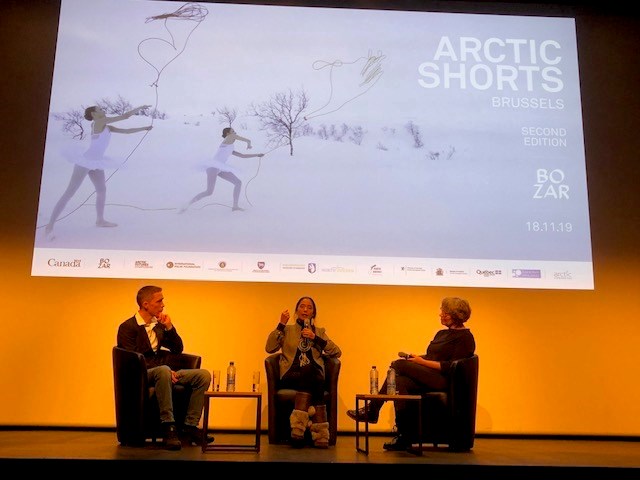Arctic Shorts - short film night with an arctic theme in Brussels

On November 18, the second edition of last year's success Arctic Shorts was organized at the BOZAR cultural center in Brussels, where North Sweden stood as co-organizers. Seven short films from the Arctic regions were shown during the evening illustrating the beauty, challenges and real life of the Arctic.
North Sweden is one of the organizers of the film screening together with the other members of the International Polar Foundation, which together also annually organizes the Arctic Futures Symposium conference, where current questions about Arctic development are at the center. On November 18, the second edition of last year's successful Arctic Shorts was organized at the BOZAR cultural center in Brussels, a side event linked to the Arctic Future Symposiums conference, which took place on November 25.
As part of the Arctic Future Symposium's tenth anniversary this year, seven short films from the Arctic regions were recorded in Norway, Canada, the Faroe Islands, Iceland, Sweden, Finland, and Greenland. The films illustrated the everyday life of the Arctic and showed the diversity of the Arctic regions in different ways where the beauty and proximity to nature in the Arctic regions was a pervasive theme including culture, art, and societal challenges. The film screening was, like last year, well attended and also gave the audience the opportunity to interact with some of the filmmakers in a subsequent panel debate.
The program also contained a short film documentary on climate change and its impact on the people of Greenland. For over an hour, the audience also had the chance to follow along to an Icelandic farm, social tensions and confrontations between friends in Faroese, listening to larynx from the icebergs in Canada and watching summer night dips in Western Forests.
The Swedish contribution was the movie Signal directed by Oscar Byström which took place in northern Sweden. The film portrays a young woman in a small society where there is a curfew because of an unknown threat where speculation revolves around either aliens or Russia. The film was produced by the production company Kangero with the support of Film in Västerbotten and had its premiere during the Gothenburg Film Festival 2018.
Following the screening, a panel discussion followed moderated by Martha Otte, Director of Tromsø International Film Festival, together with filmmakers Inuk Jørgensen director of the film "Home" from Greenland and Odile Joannette, CEO of Wapikoni Mobile, Quebec, Canada. The panelists talked about the actual creation process of the films and highlighted the increased prevalence of films with new perspectives on the international film arena where the indigenous people's perspective in the Arctic has begun to take more place. In addition, new technology development has given domestic film industries ownership where more and more young filmmakers can take more space in the creation process. The importance of allowing the local and unique film media to grow and take their own place in the film industry relative to the prevailing Hollywood norm was emphasized by both panelists.
Martha Otte ended the evening with the hope that next year will be able to put Arctic film and culture on the agenda in Brussels. By awarding filmmaking from our own regions, we increase the knowledge and understanding of a part of the world that is not always portrayed. This also creates ownership of the image of people in the Arctic that exist around the world, according to Martha Otte.
/Johannes Stenberg
